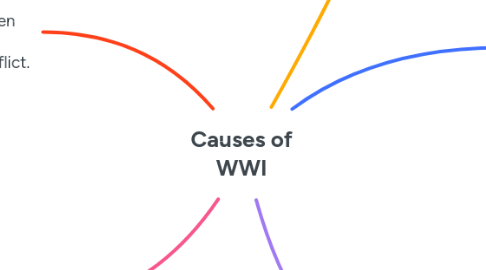Causes of WWI
by kazi zayeed

1. Militarism (Long-Term cause) Definition: The belief in building up a strong military and being prepared for war.
1.1. Key Points: 1. Arms Race: European countries, especially Germany and Britain, increased their military strength. Germany built a powerful navy to rival Britain’s Royal Navy. 2. War Plans: Countries developed detailed military strategies (e.g., Germany’s Schlieffen Plan) that made war more likely. 3. Glorification of War: Many European nations viewed war as a noble and heroic endeavor, encouraging aggressive military policies.
2. Alliences (Long-Term Cause) Definition : Agreements between nations to provide military or pilitocal support in case of conflict.
2.1. Key Points: Two Rival Alliances: The formation of the Triple Alliance (Germany, Austria-Hungary, Italy) and the Triple Entente (Britain, France, Russia) created a highly polarized Europe. Domino Effect: If one country was attacked, its allies were bound to defend it, leading to a chain reaction. Secret Treaties: Many alliances were made in secrecy, increasing suspicion and mistrust among nations.
3. Imperialism (Long-Term Cause) Definition: A policy in which strong nations seek to dominate weaker territories economically, politically, or militarily.
3.1. Key Points: 1. Competition for Colonies: European nations competed for overseas territories, especially in Africa and Asia, leading to tensions (e.g., France and Germany clashed over Morocco). 2. Economic Rivalry: Industrialized nations fought for access to raw materials and markets. 3. German Expansionism: Germany sought to challenge Britain and France’s colonial dominance, increasing hostility.
4. Nationalism (Long-Term and Short-Term Cause) Definition: Extreme pride in one’s nation or ethnic group, sometimes leading to a desire for independence or superiority over others.
4.1. Key Points: 1. Ethnic Tensions: Various ethnic groups, especially in Austria-Hungary and the Balkans, sought independence. 2. Rivalries: France wanted to reclaim Alsace-Lorraine from Germany (lost in 1871), fueling animosity. 3. Assassination of Archduke Franz Ferdinand: Serbian nationalist Gavrilo Princip assassinated the heir to the Austro-Hungarian throne, triggering a crisis that led to war.
5. Assassination of Archduke Franz Ferdinand Definition: The immediate event that triggered WWI.
5.1. Key Points: 1. June 28, 1914: Archduke Franz Ferdinand and his wife were assassinated in Sarajevo by Gavrilo Princip, a member of the Black Hand (Serbian nationalist group). 2. Austria-Hungary’s Response: Austria-Hungary issued an ultimatum to Serbia, which Serbia partially rejected. 3. War Declaration: Austria-Hungary declared war on Serbia, setting off a chain reaction as alliances came into play.


